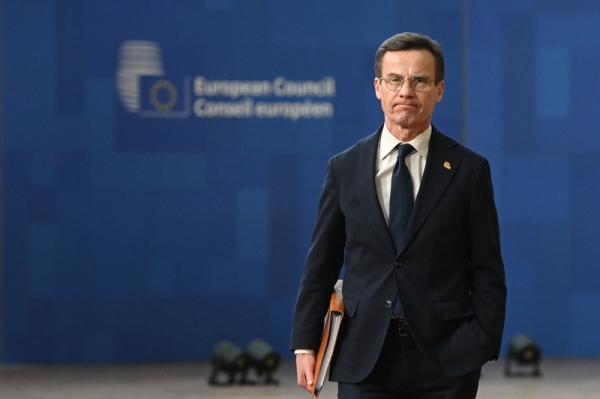No Nato deal despite Hungary-Sweden summit meeting
Hungarian prime minister Viktor Orbán is still flashing his Nato veto on Sweden, after dropping his EU veto on Ukraine.
Orbán’s Fidesz party in Budapest on Thursday (1 February) derailed moves to ratify Sweden’s Nato entry — the same day that Orbán himself bowed to EU pressure at a summit in Brussels to let flow funding for Ukraine.
-

Hungarian prime minister Viktor Orbán (l) (Photo: consilium.europa.eu)
The Nato and Ukraine decisions are not formally related.
But they are both part of a broader Western strategy to stop Russian aggression in Europe, both linked to Orbán’s close ties with Moscow, and both part of his power games on the international stage.
Hungary is the only Nato state that hasn’t ratified Sweden’s accession, as well as the only EU member state which attempted to hold up aid for Ukraine.
Orbán met Swedish prime minister Ulf Kristersson in the margins of the EU summit in Brussels for 15 minutes, without any breakthrough.
Some EU diplomats also hoped there might be a breakthrough in Budapest on Monday, when the Hungarian parliament, the Országgyűlés, is to hold an extraordinary session on the Nato issue.
But Fidesz dashed those hopes on Thursday when Orbán’s party informed the parliament speaker that they would boycott Monday’s session, which had been called by Hungarian opposition parties.
And that meant Monday’s session would do nothing, except giving opposition parties five minutes each of speaking time to harry the government.
It also meant they would be speaking to a largely empty chamber, where Fidesz and its allies hold 135 out of 199 seats.
"That’s their [Fidesz’] position for now — of course, it could change. We saw at the EU summit how surprising Orbán can be. He was still talking about stopping Ukraine aid on Thursday morning, but by lunchtime he had changed his mind," said Ágnes Vadai, the shadow defence minister from the opposition Democratic Coalition party in Hungary.
Orbán has become an EU pariah over his abuse of rule-of-law at home and his ties with Russian president Vladimir Putin.
His EU cave-in on Thursday came after he lost allies in Poland, where elections last October defenestrated the Orbán-friendly Law and Justice party.
It also came after a U-turn on Ukraine by one of Orbán’s last friends at EU summits, Slovak prime minister Robert Fico.
Fico came to Brussels on Thursday "even though he was ill", a Slovak source said, but he also went to Kyiv in January and shook hands on EU aid with Ukrainian president Volodomyr Zelensky.
Orbán had tried and failed to leverage his Ukraine EU-aid veto to get hold of billions of euros of EU funds for Hungary, which are being withheld due to his rule-of-law backsliding.
It’s unclear what he hoped to get from his last veto — on Sweden and Nato — since Fidesz, as usual, didn’t give a reason for its Hungarian parliament decision.
But he already got flak from the US ambassador in Budapest.
"When you look at Hungary’s foreign policy, whether it be suggesting raising questions about Ukraine’s EU accession, stymying efforts to provide financial support to Ukraine, meeting with Vladimir Putin, resisting efforts to diversify off of Russian energy, resisting sustained efforts to close Kremlin platforms inside of Hungary, all of these have something in common. And it’s something that is leaving Hungary more isolated from its partners within Nato and its partners within the EU," said US ambassador to Hungary David Pressman, in the Financial Times newspaper on 26 January.
"We absolutely have leverage, that is true ... and we’re prepared to use our leverage," Pressman added, referring to US pressure on Orbán, without giving details.
And all that meant the best price Orbán might get for his Nato veto on Sweden is a photo-op with Sweden’s Kristersson, if the Swedish leader agrees to go to Budapest to court his favour.
"It’s hard to rationalise, because he [Orbán] is increasingly irrational — he just wants a show of respect from the Swedish prime minister," said Vadai, the Hungarian opposition MP, on Thursday.
For his part, Kristersson told Orbán in Brussels on Thursday that he would only go to Budapest subsequent to Nato ratification as a gesture of goodwill, according to EU sources.
The next time the Hungarian parliament is due to meet is on 26 February to open its spring session.
The moment of truth for Orbán will be on 21 February, when political party chiefs meet to set the spring agenda.
But if Kristersson kept his word and Orbán’s EU and Nato colleagues ramped up pressure, he might get nothing for his Nato veto either in the end.

